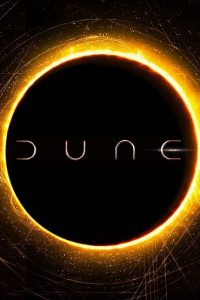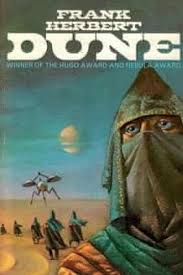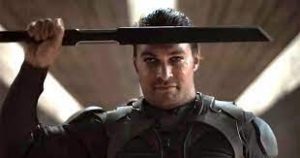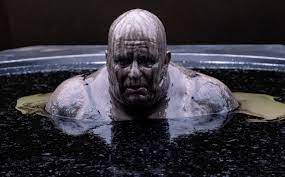
© Legendary Pictures / Warner Bros. Pictures
Like everywhere else, one sector in Sri Lanka heavily hit by Covid-19 was the country’s cinemas. In Colombo, establishments like the Liberty, Savoy and Regal had stood closed-up, empty and silent for so long that I’d begun to doubt if they’d ever open their doors again. However, with the Sri Lankan Covid-19 death toll down (for now), the authorities have permitted cinemas to reopen, albeit working at a reduced capacity. During the first half of November, their auditoriums could only be 25% full. For the month’s second half, the maximum capacity has been increased to 50%. To do our bit to help Sri Lanka’s beleaguered cinema industry, myself and a mate went a few days ago to the Scope multiplex at Colombo City Centre shopping mall. There, we watched Dune, this year’s big-budget, Denis Villeneuve-directed adaptation of the famous 1965 science-fiction novel by Frank Herbert. Or at least, Villeneuve’s adaptation of the first half of it, as Dune is one fat book.
And we had no regrets about seeing Dune in a cinema. It’s a visually majestic creation that needs to be seen on a big screen to be properly appreciated. In fact, you’ll be committing a minor crime against celluloid if you watch it in reduced form on a TV or laptop screen. And if you dare to watch it on a phone-screen… Well, you don’t deserve to live.
I have to say, though, that I read Herbert’s novel as a teenager and it was no favourite of mine. In part, my being unimpressed by it was probably down to bloody-mindedness. A lot of earnest, nerdy people gushed about how great it was, which probably predisposed me to not liking it. This was similar to my less-than-enthusiastic reaction to J.R.R. Tolkien’s much-worshipped Lord of the Rings – although unlike Rings, I did read Dune to the end. (With Rings, I gave up four-fifths of the way through.) Also, it didn’t help that I read Dune a couple of years after Star Wars (1977) came out. Many of the book’s plot elements – a scheming galactic empire, a desert planet, an elite sect with psychic powers – had recently featured in George Lucas’s sci-fi / fantasy blockbuster, so they seemed less fresh than they had in 1965.

© New English Library
Though I found Lord of the Rings overrated on the page, I did enjoy the movies that Peter Jackson made of it in 2001, 2002 and 2003. Well, apart from the last half-hour of the final one, The Return of the King, which consisted of nothing but various characters getting married. A second-rate reading experience can, with an excellent cast, a great director and all the epic locations and special effects that Hollywood money can buy, be turned into a first-rate viewing experience.
And so it is with Dune.
Its cast is wonderful – Oscar Isaac, Rebecca Ferguson, Timothée Chalamet, Stellan Skarsgard, Dave Bautista, Josh Brolin, Jason Mamoa, Charlotte Rampling, Stephen McKinley Henderson, Sharon Duncan-Brewster and Javier Bardem – and director Villeneuve has already helmed two of the past decade’s greatest sci-fi movies, Arrival (2016) and Blade Runner 2049 (2017). And its 165-million-dollar budget has been put to good use. The filming locations in the UAE and Jordan really do transport you to the film’s main setting, the endlessly sandy and murderously hot desert-planet Arrakis; while the special effects, conjuring up fleets of spacecraft that stand like gigantic, angular cathedrals when they’re parked on planets’ surfaces, but look as tiny and inconsequential as pollen-grains when they’re bobbing in the black void of space, are stunning. Hence, the absolute necessity to see Dune on a large screen.

© Legendary Pictures / Warner Bros. Pictures
Denis Villeneuve, of course, isn’t the first filmmaker to bring Dune to the screen, for an earlier cinematic version of it had appeared in 1984, directed by that genius of visionary weirdness, David Lynch. The 1984 Dune was a box-office flop and received much abuse from critics – I remember the New Musical Express retitling it Dung – but I didn’t think it was that bad. Lynch added some delightfully bizarre touches to the story and he arguably had an even better cast of actors than Villeneuve: Kyle MacLachlan, Jurgen Prochnow, Francesca Annis, Kenneth McMillan, Paul Smith, Patrick Stewart, Richard Jordan, Freddie Jones, Sian Phillips, Virginia Madsen, Jack Nance, José Ferrer, Everitt McGill, Brad Dourif, Max von Sydow and the great (and now, sadly, late) Dean Stockwell. Sting was in it too.
Alas, Lynch’s producer was old-school movie mogul Dino De Laurentiis, who wanted Dune to be a regulation two-hour movie. Cramming all the events of Herbert’s doorstop-sized book into that caused massive problems for the script. Early on, Lynch had wisely envisioned Dune as two movies, and then proposed it as a three-hour film, but this cut no ice with old Dino.
I remember going to see Lynch’s Dune at a cinema in Aberdeen with my girlfriend of the time. Having read the book I was familiar with the plot, which goes like this… (Beware – spoilers are coming.) In the distant 102nd century, the galaxy is ruled by an empire that incorporates a number of powerful families, or Houses. One of these, the House Atreides, headed by the well-meaning Duke Leto (Isaacs in the new Dune, Prochnow in the old one), his ‘concubine’ Lady Jessica (Ferguson now, Annis then) and their son, the young Paul (Chalamet now, MacLachlan then), is entrusted with running the desert-planet Arrakis. Arrakis is vital for the Empire because a mysterious ‘spice’- in reality a consciousness-expanding drug – is mined there and its properties enable spaceship-navigators to find their way through interstellar space. The planet’s indigenous inhabitants, the reclusive and Bedouin-like Fremen, are suspicious of the Atreides because previously the Empire had put them under control of another House, the Harkonnen, who treated them genocidally.
Before Leto can win hearts and minds on Arrakis, the Harkonnen launch an attack to retake the planet, with the Emperor’s blessing – the whole manoeuvre has been a plot to get rid of the potentially troublesome Atreides. The Atreides are wiped out, save for Paul and his mother Jessica, who flee into the planet’s deserts. They now have the formidable task of rallying the distrustful Fremen and persuading them to retake Arrakis from the homicidal Harkonnen – which, in the book’s later stages, they do.
Villenueve’s film ends with Paul and Jessica fleeing the Harkonnen – a second Dune movie, which will tell the remaining story, has now been greenlighted. Poor old Lynch, though, had to squash everything into just over two hours. I remembering being in an Aberdonian pub after seeing his Dune with my ex-girlfriend, who hadn’t read the book. I spent about an hour trying to explain the film’s plot to her, which she’d been flummoxed by.


© Legendary Pictures / Warner Bros. Pictures
Villeneuve’s Dune only covers half of the book and is still 19 minutes longer than Lynch’s version, so obviously the story gets more space to breath. This also enables Villeneuve to do a lot of the important sci-fi business of ‘world-building’. It’s gratifying too that Dune’s secondary characters, the various soldiers, courtiers and allies of the House Atreides, like Gurney Halleck (Brolin now, Stewart then), Duncan Idaho (Mamoa now, Jordan then), Thufir Hawat (McKinley Henderson now, Jones then) and Dr Liet-Kynes (Duncan-Brewster now, von Sydow then) get much more time to establish themselves and win the audience’s sympathy. In the compressed 1984 Dune, their roles were brief and their deaths, if they occurred, were blink-and-you’ll-miss-them events.
Certain critics have sniped at this new version of Dune for being humourless. Now while I admit to counting a total of three jokes during the film’s entire 157-minute running time – it’s telling that two of those jokes turn up in the trailer – I have to say I found it refreshing to experience a science fiction film willing to treat its subject matter seriously and not populate it with, say, bumbling comedy droids or wisecracking bipedal rodents. In effect, those critics are showing their snobbery. They’re protesting: “But this is just science fiction! It’s not, it can’t be serious! You’ve got to have bumbling comedy droids in it! And wisecracking aliens!” So, stuff ’em.

© Legendary Pictures / Warner Bros. Pictures
One thing David Lynch’s Dune was memorable for was its depiction of the Harkonnen. Played by Kenneth McMillan, Paul Smith, Brad Dourif and Sting, they were a grotesque, evilly-perverted bunch – no more so than McMillan’s Baron Harkonnen, who was a levitating, leering sack of pus. Probably wisely, Villeneuve doesn’t try to out-Lynch Lynch here and makes his Harkonnen a more sombre lot, communicating their malevolence through stillness rather than histrionics. Stellan Skarsgard is especially effective as a brooding, Brando-esque Baron.
I read somewhere that Frank Herbert intended the good guys, the Atreides, to be descended from the Greeks on faraway, long-ago earth, although some visual and verbal references to bullfighting in both his book and Villeneuve’s film suggest they’re Spaniards. However, when the Duke, his family and courtiers arrive on Arrakis, the film shows them being led out of their spaceship by a bagpiper… which implies they’re actually Scottish. Well, their home planet’s name is Caladan, which sounds like ‘Caledonia’. One of them is called Duncan and another is called Gurney – Scots gurn a lot. And by half-time they’ve already been slaughtered. So yup, I think they’re Scottish.

© Legendary Pictures / Warner Bros. Pictures
One thing I believe makes this version of Dune so good is that, in telling only the book’s first half, it’s a story of tragedy. And tragedy, as any student of Shakespeare will confirm, is one of the most powerful forms of narrative. I suspect Villeneuve will find it harder to make the next instalment of Dune, dealing with how Paul marshals his forces and finally restores order on Arrakis, as gripping. For me, at least, downbeat endings last longer in the imagination than happy ones.
Anyway, for now, after Arrival and Blade Runner 2049, Dune completes a science-fictional hat-trick for Villeneuve. Perhaps it’s not quite as impressive a run as Stanley Kubrick achieved with the sci-fi or sci-fi-related Dr Strangelove (1964), 2001: A Space Odyssey (1968) and A Clockwork Orange (1972), but it’s still pretty amazing. Let’s hope he can knock Dune 2 out of the park and make this triumphant threesome a foursome.

© Legendary Pictures / Warner Bros. Pictures
